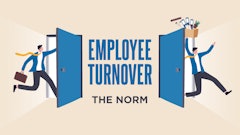
Over the last several months, many U.S. cannabis companies and multi-state operators have had to cut a percentage of their workforce, close facilities, and engage in other cutting-cost efforts as the industry's downturn deepens.
And these tough times and cost-cutting efforts can weigh heavily on employees–leading some to experience heightened stress and anxiety, concerns about job security, decreased productivity, and more.
Implementing long-term and effective strategies to manage employee morale during a market downturn is crucial to protect the company culture and preserve the well-being of remaining employees.
One company that is no stranger to this is Jushi Holdings, a multi-state vertically integrated cannabis company, which had to cut a percentage of its workforce to stay afloat in these tough times.

"I often describe it as the culture taking a punch in the stomach," says Nicole Upshaw, chief people officer at Jushi. "It was tough to understand that we're not immune to those regular company activities like cutting parts of our workforce when the economy has a downturn. It was a realization that we are different, but this stuff will impact us just the same."
Upshaw says Jushi strongly evaluated its cost-cutting decisions rather than just deciding to take the mass layoff approach.
"[We were not] just going to cut 20 percent, and who cares what it is," she says. "There are pros and cons to either. If you take the machete approach and cut 20 percent no matter what it is, it's done faster, and you can move on faster, but you might not have cut the right people. We spread it out and said, 'Let's ensure we remove things as we don't need them anymore. Not just to hurry up and do it.'"
She says that for many of Jushi's employees, this may have been the first time they experienced layoffs.
"They might not have been working during the tough recession we had from 2008 to 2012," she says. "For them, they're experiencing this for the first time, and that is hitting them harder because they don't have that perspective to be like, 'Oh yeah, today this stinks, but this is just what companies have to do.' It was more like, 'You've got to be kidding me. You're doing this?'"
Through these tough decisions and the market downturn, maintaining a positive employee experience and strong company culture is Upshaw's main priority. So, what strategies is the company utilizing to achieve this?
Communication is Key
Good communication is critical in the implementation of layoffs, Upshaw says.
"Your greatest employee experience tool is communication and honesty and getting in front of people and saying, ‘This is what's going on,’" she says. "People understand macroeconomics. People understand that the company isn't free cash flow positive yet and that those are not good assumptions. So, one of the things that we did is get in front of our people and say, 'Hey, this is what's going on.'"
Upshaw says not all employees may listen to company earnings calls, which typically involve discussions about financial performance and business strategies.
"For my departments, I would do recaps of financials [and] I would explain the importance of needing to get to free cash flow positive so we can pay our debt with the money that we are making from our operations and explain what that means," she says. "I would explain this is what we have to do to get there, and this is what we [don't] want to do. Yes, these are really tough decisions, [but] if we want this to be a place where people can work, we have to make tough choices."
It's also crucial to reiterate the end goal to your employees and let them know the plan to get there while giving them time to process the changes.
Upshaw says that Jushi also restructured its retail labor model to a budgeted labor cost approach, which includes estimating and allocating funds for labor expenses.
"That was a big change because [they] had to settle into it, but when we [told them] this is what we want to do [and] this is where we want to go, and the team got there in six weeks. That's not what we expected, but they just killed it," she says. "And I think it was just because of that direct communication that we had from the top telling them what we were doing and why.
"As soon as our next earnings call happened and we had our financial release, I got back on the call and said, 'Okay, see this line here, this is where this was, and this is where it is now. You see revenue drop in the retail business because of price compression, but look, we also dropped this expense, and what we intended to do worked.' I think that's really important that they know it wasn't all for nothing."
Be Intentional
During a market downturn, it is also important to be intentional with spending and actions.
"What you don't want to do when you are making really tough decisions, and people are seeing their friends lose their jobs, is throw parties [and] ignore it," she says, adding that it's important to look at it from an employee's point of view.
Upshaw says for Jushi, it was important to implement genuine actions and activities to help boost employee morale rather than, for example, just throwing a bunch of company swag at them.
"We are doing things like buying popcorn machines, and the leaders are going into their [departments], and they pop popcorn for everybody and just say thank you," she says. "That's something that's just very small, but it's the leaders showing leadership and that they appreciate them spending their time, which is very valuable."
Listen
For Jushi, finding ways to open direct communication with its employees is vital, Upshaw says.
The company is soon launching a platform called "Dope Ideas," where any employee can submit an idea or thought, and it gets sent directly to the leader of that department.
"Right now, if you think of a budtender having an idea, it's got to go to their general manager and then their state director and then their boss," she says. "That idea has got to go through several people to get to the person who actually might do something with the idea. … The goal here is to say all 1200 people at Jushi have great ideas and can get those to the decision maker without all the friction."
Through the layoffs, Jushi also made the strategic decision to keep its learning and development team, which helps onboard new employees and develops educational courses to teach about the industry and the business.
"We decided from my experience coming from a large retailer that in [this] high turnover environment, if you really want your operating model to be efficient, then training has to be something you invest in," she says. "We've really doubled down on that this entire time, [and] have been developing courses for our retail employees and now are heavily focused on training for our manufacturing employees."


























